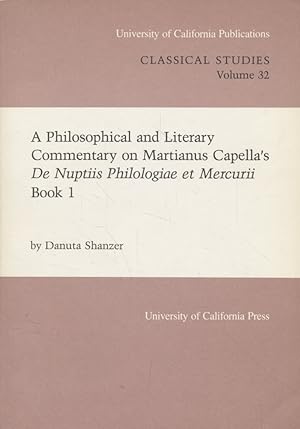0520097165 - A Philosophical and Literary Commentary on Martianus Capella's De Nuptiis Philologiæ Et Mercurii Book 1 Uc Publications in Classical Studies by Shanzer, Danuta (1 results)
Product Type
- All Product Types
- Books (1)
- Magazines & Periodicals
- Comics
- Sheet Music
- Art, Prints & Posters
- Photographs
- Maps
-
Manuscripts &
Paper Collectibles
Condition
- All Conditions
- New
- Used
Binding
- All Bindings
- Hardcover
- Softcover
Collectible Attributes
- First Edition
- Signed
- Dust Jacket
- Seller-Supplied Images
- Not Printed On Demand
Seller Location
Seller Rating
-
A Philosophical and Literary Commentary on Martianus Capella's de Nuptiis Philologiae Et Mercurii Book 1. University of California Publications in Classical Studies, Band 32.
Published by UNIV OF CALIFORNIA PRESS., 1987
ISBN 10: 0520097165ISBN 13: 9780520097162
Seller: Fundus-Online GbR Borkert Schwarz Zerfaß, Berlin, Germany
Book
paperback. Condition: Gut. IX, 237 Seiten Altersgemäß sehr guter Zustand / Very good condition for age - The single greatest problem related to the study of Martianus Capella is his date: guesses have ranged over three centuries. Knowledge of this fact would be an important tool for the study of the De Nuptiis. Martianus is the source of much philosophical-religious material, and it is essential to know for what period he attests its existence. The other side of the coin is that, if Martianus s date were known, there would be a better chance of understanding the literary features of his opus. -- Much here summarises and repeats material found elsewhere. Regrettably this is necessary in order to give an accurate picture of the dating problem. Strictly speaking, I do not propose a new date; the late date was the first suggested for Martianus, but I shall add some new arguments in attempting to prove my case, beginning with biographical details. Ghosts that deserve to be laid still lurk in that portion of the Martianean mansion. -- THE AUTHOR -- Virtually nothing is known about Martianus, and what is known is extracted from De Nuptiis itself. The manuscripts give his full name as Martianus Minneus Felix Capella. He was not, however, known as Martianus, but probably as Felix or as Felix Capella. Satura addresses him in Book VI as Felix, vel Capella, vel quisquis es non minus sensus quam nominis pecudalis, and in the final metrum with Felicis, inquit, sed Capellae flemine. Two of the earliest testimonia, Fulgentius and Cassiodorus, both know him by this name. It is at he end of Gregory of Tours s Historia Francorum ( 10.31 ) that Martianus noster ls first found. -- He had a son, Martianus, to whom he dedicated his work. The opening prose of De Nuptiis is a dialogue with the young man. He may have been fifty years when he wrote his magnum opus: in the prologue he describes himself as respersum capillis albicantibus verticem incrementisque lustralibus decuriatum ( 4.6 ) , " a head sprinkled with whitening hairs, and ( literally ) multiplied by ten with the increments of the lustra." An elaborate periphrasis for his own age, if one accepts the paradosis decuriatum. ISBN 9780520097165 Sprache: Englisch Gewicht in Gramm: 472.


